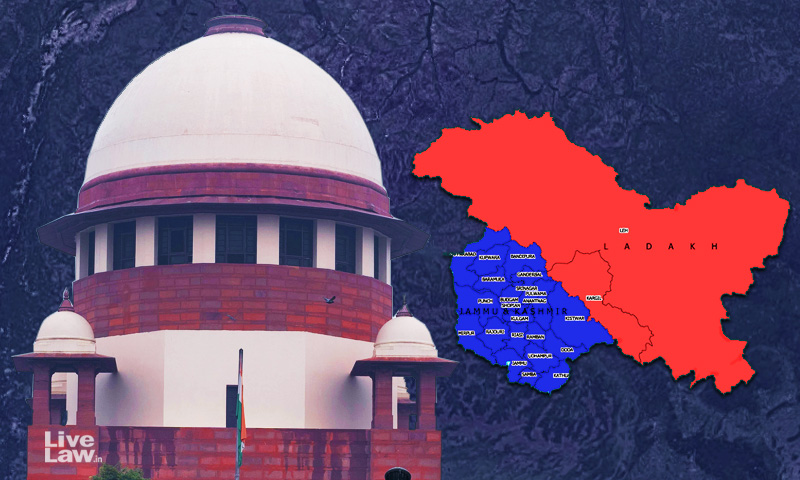
- Select a language for the TTS:
- UK English Female
- UK English Male
- US English Female
- US English Male
- Australian Female
- Australian Male
- Language selected: (auto detect) - EN
Play all audios:
A writ petition has been moved before the Supreme Court by two residents of the UT Jammu and Kashmir challenging the March 2020 decision of the Central government to appoint a Delimitation
Commission to redraw Lok Sabha and assembly constituencies of the Union Territory Jammu and Kashmir. The plea has been moved by HAJI ABDUL GANI KHAN AND DR. MOHAMMAD AYUB MATTOO seeking a
declaration that the constitution of the Delimitation Commission u/s 3 of the Delimitation Act, 2002, is without power, jurisdictions, and authority. The plea has been filed through M/S
LAWFIC and it has been drawn by Senior Advocate Ravi Shankar Jandhyala. It may be noted that delimitation is the process of redrawing boundaries of Lok Sabha and state Assembly seats in
order to represent the changes in the population. Elections could be held only after this exercise is completed so as to ensure that the population is truly represented in the Lok Sabha and
Legislative Assemblies. "DELIMITATION DECISION WITHOUT JURISDICTION" The plea states that the action of the Central government in issuing the notifications for the Delimitation of
Assembly Constituencies for the UT of Jammu and Kashmir was without jurisdiction as it usurped the jurisdiction of The Election Commission of India. It is important to note that the Union
Government had issued a notification on March 6, 2020, in the exercise of power under section 3 of the Delimitation Act, 2002, constituting a Delimitation Commission, with JUSTICE (RETD)
RANJANA PRAKASH DESAI as Chairperson, for the purpose of delimitation of Assembly and Parliamentary constituencies in the Union Territory of Jammu and Kashmir and the state of Assam,
Arunachal Pradesh, Manipur, and Nagaland, for a period of one year. However, another notification was issued on March 3, 2021, which extended the term of the Delimitation Commission by one
more year and omitted the names of the four states, and limited the scope of delimitation exercise to only UT of J&K. Importantly, the plea questions as to when Art. 170 of the
Constitution of India provides that the next delimitation in the country will be taken up after 2026, then why UT of Jammu and Kashmir had been singled out. In this regard, the plea further
argues that any move to increase the number of seats in Jammu and Kashmir must be preceded by a Constitutional Amendment, besides the amendment of Elections Laws, namely, the Delimitation
Act, 2002 and the Representation of People Act, 1950. > "_When the last Delimitation Commission was set up on 12th July > 2002, in exercise of powers conferred by section 3 of the
> Delimitation Act, 2002, after the 2001 Census to carry out the > exercise throughout the country, Delimitation Commission had issued > Guidelines and Methodology for the
Delimitation of Assembly and > Parliamentary Constituencies vide Letter No. 282/DEL/2004 dated 5th > July, 2004, along with the Constitutional and Legal Provisions. IT > CLEARLY
STATED THAT THE TOTAL NUMBER OF EXISTING SEATS IN THE > LEGISLATIVE ASSEMBLIES OF ALL STATES, INCLUDING UTS OF THE NATIONAL > CAPITAL REGION AND PONDICHERRY, AS FIXED BASED ON THE 1971
CENSUS > SHALL REMAIN UNALTERED TILL THE FIRST CENSUS TO BE TAKEN AFTER THE > YEAR 2026,_" the plea states. FURTHER AVERMENTS IN THE PLEA Significantly, the plea also states that
the increase in the number of seats from 107 to 114 (including 24 seats in Pakistan Occupied Kashmir) in the Union Territory of Jammu & Kashmir, as provided in the J&K
Reorganisation Act, 2019, is ULTRA VIRES the Constitutional Provisions such as ARTICLES 81, 82, 170, 330 AND 332 and the Statutory Provisions particularly SECTION 63 OF THE JAMMU &
KASHMIR REORGANISATION ACT, 2019. Referring to the decision of the Central Government to constitute the Delimitation Commission to take up delimitation in the UT of J&K and states of
Assam, Arunachal Pradesh, Manipur, and Nagaland, the petitioners have called it violative of Art 14 by averring that the Government's order _speaks of two different population ratios_.
> "_The delimitation in UT of J&K' is to be done on the basis of the > 2011 population', while the delimitation in the four states of the > North East are to be
done on the basis of the 2001 population. This > is unconstitutional, violates Art 14, as it attracts > Classification_," the plea states. In this regard, the plea also states
that the order of the Central Government of March 3, 2021, omitting the names of states of Assam, Arunachal Pradesh, Manipur, and Nagaland from the process of delimitation and deciding to
conduct delimitation only for the Union Territory of Jammu & Kashmir is UNCONSTITUTIONAL AS IT AMOUNTS TO ''CLASSIFICATION''. The plea also states that it is only the
Election Commission that must carry out the process of delimitation (for necessary updation) after the Parliamentary and Assembly Constituencies Delimitation Order, 2008 is notified.
"_Nobody is competent to carry out the delimitation process since the delimitation has been completed and the Delimitation Commission itself has become inappropriate. Issuance of
Notification by the Law and Legislative Department appointing the Delimitation Commission is without jurisdiction, unconstitutional and ultra vires to the election laws apart from J&K
Reorganisation Act, 2019_," the plea concludes by averring thus.







